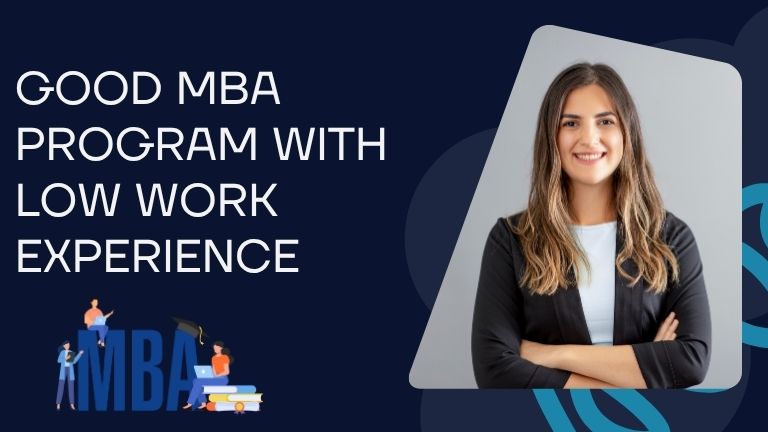An MBA remains one of the most prestigious degrees for career advancement and leadership development. However, many top business schools traditionally prefer candidates with 3 to 5 years of professional work experience, believing experienced students bring maturity and practical insights to the classroom discussions. But the educational landscape is evolving—more universities today are opening doors to candidates with low work experience or even fresh graduates. So, if you’re aiming for a strong MBA program without extensive corporate exposure, it’s absolutely possible with the right preparation and strategy.
This guide will help you understand why work experience matters, how to build a standout profile with limited experience, and which MBA programs welcome early-career candidates in 2025.
Why Is Work Experience Preferred in MBA Admissions?
Business schools value applicants with work experience primarily because:
- Real-World Perspective: Experienced professionals enrich case discussions with insights drawn from actual workplace challenges.
- Leadership Potential: Work history often demonstrates teamwork, leadership, and problem-solving abilities critical for managerial roles.
- Classroom Engagement: Students with experience can contribute actively in experiential learning scenarios, like simulations or group projects.
However, admissions committees understand that not everyone has the chance to gain years of industry experience, especially in fast-changing economies and for international applicants. What matters most is the potential you show beyond the years on your resume.
Tips to Get Into a Good MBA Program With Low Work Experience
1. Focus on Academic Excellence
Strong academic credentials, particularly in quantitative or business-related undergraduate subjects, can counterbalance limited professional experience. Top MBA programs look for consistent high grades that prove your ability to handle rigorous coursework.
2. Score High in Entrance Exams
Exams like the GMAT, GRE, CAT, or XAT carry significant weight. A strong score signals your analytical skills and readiness for MBA-level challenges. For freshers and low experience candidates, this becomes one of your biggest assets.
3. Highlight Leadership in Academics or Extracurriculars
Admissions committees don’t look for work titles alone—they value leadership potential. Demonstrate leadership through college clubs, student government, volunteer work, or community service projects. Show initiatives you led or impact you created.
4. Showcase Internships and Volunteer Work
Internships, part-time roles, research assistantships, or social initiatives are valuable practical experiences. Detail your learnings, responsibilities, and achievements in these roles in your resume and essays.
5. Write a Compelling SOP and Essays
Your Statement of Purpose (SOP) and admissions essays should clearly communicate:
- Why you want to pursue an MBA at this stage.
- How your background brings diversity to the class.
- Your career goals and how the MBA fits into your vision.
Authenticity and conviction in your writing can greatly impress committees.
6. Choose the Right Business Schools
Several programs worldwide cater to early-career applicants:
- In India: IIM Indore (IPM + MBA dual program), NMIMS, Symbiosis, and other institutes welcome fresh graduates.
- Abroad: Schools like INSEAD (early career MBA), HEC Paris, ESSEC, Yale Silver Scholars, and some US universities offer specialized options for candidates with minimal or no work experience.
7. Build Soft Skills
Strong communication, teamwork, adaptability, and problem-solving skills are crucial. These can be developed through extracurricular activities, online courses, workshops, or international exposure.
Examples of MBA Programs Accepting Low Work Experience Candidates
Many top-tier institutions offer programs specifically designed for early-career professionals:
- Yale School of Management’s Silver Scholars Program: Accepts exceptional final year students, combining academics with a full-time internship.
- University of Texas at Dallas – Naveen Jindal School of Management: No strict work experience requirement; values academic performance and internships.
- UCLA Anderson Early Career MBA: Admits exceptional college seniors with leadership potential.
- INSEAD Early Career MBA: Designed for candidates with limited professional experience looking for a fast-track leadership education.
Overcoming the Low Experience Challenge With a Strong Profile
- Early GMAT/GRE Preparation: Take exams while still in undergrad to capitalize on study momentum.
- Mentorship & Networking: Seek guidance from MBA alumni, professors, or career coaches to understand application nuances.
- Internship & Project Focus: Gain relevant internships that showcase real-world skills, even if short or unpaid.
- Effective Application Presentation: Focus especially on your essays, interviews, and recommendations to highlight maturity, goals, and leadership.
Conclusion
Getting admitted to a good MBA program with low work experience is entirely achievable. While experience enriches your profile, business schools ultimately seek candidates with potential, intellectual curiosity, and leadership qualities. By focusing on academics, excelling at entrance tests, gaining meaningful internships, and crafting strong personal statements, you can prove you’re ready for top-tier MBA education.
Stay informed about programs welcoming early-career applicants and prepare strategically. Your work experience journey is just beginning—an MBA can be the perfect launchpad.
Online Degree vs Campus Degree: Pros and Cons
How to Choose a Specialization in Master’s Degree
Best E-Learning Tips for Students in 2025–26
